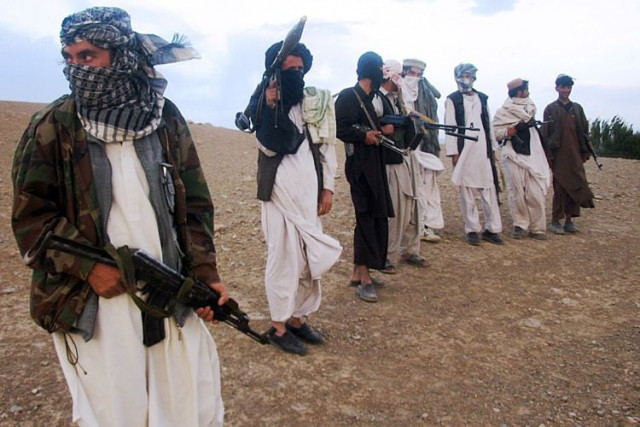Afghan peace process: Islamabad ready to back peace talks
Taliban, US deny any talks were scheduled to take place in Doha on Thursday

A file photo of the Afghan Taliban. PHOTO: AFP
Pakistan on Thursday signalled its willingness to support the process of reconciliation in Afghanistan as reports swirled about the Afghan Taliban negotiators opening dialogue with US officials in the Qatari capital of Doha.
“Pakistan in all sincerity will support the process … [of] reconciliation between the Afghan government and the Afghan Taliban … as peace in Afghanistan will contribute to peace in the region,” the Inter-Services Public Relations (ISPR), the military’s media wing, said in a rare statement on the prospects of peace in the neighbouring country.
“Pakistan has always supported such a process, and re-emphasised it to be absolutely transparent, Afghan-owned and Afghan-led. We hope that all stakeholders will continue to act with responsibility not to allow detractors of peace to succeed,” the ISPR statement said. “The onus for negotiations to succeed lies on both parties concerned.”
Reuters quoted a senior member of the Afghan Taliban as saying by telephone from Qatar that their negotiators would hold a first round of talks with US officials in Doha on Thursday.
However, both the White House and the Taliban were quick to deny the development.
Taliban spokesman Zabihullah Mujahid dismissed the reports as ‘fabricated’ and denied there were plans to hold talks with US officials on Thursday. “These reports are untrue and far from reality. We have neither changed our policy with regards to talks nor have given serious consideration to this option because Afghanistan is still under foreign occupation,” he said in a Pashto-language statement.
“The United States currently has no meetings with the Taliban scheduled in Doha,” said Bernadette Meehan, a spokeswoman for the White House’s National Security Council. “We remain supportive of an Afghan-led reconciliation process whereby the Taliban and the Afghans engage in talks toward a settlement to resolve the conflict in Afghanistan,” she added.
US State Department Spokeswoman Jen Psaki too said “there have not been any direct talks between the US and the Taliban since January 2012, when the Taliban broke them off.”
A spokesman for Afghanistan’s President Ashraf Ghani also denied any talks were scheduled to be held in Doha on Thursday.
A senior Taliban leader, however, contradicted Mujahid’s statement. Speaking on condition of anonymity, he said the faction’s leaders have been awaiting a response’ from their supreme leader Mullah Omar ever since the idea of peace talks was floated by Pakistani officials.
“I can say the Taliban are now under pressure to start the dialogue. The Pakistanis are urging us to join the peace process and they have reiterated the same in a recent interaction,” the Taliban leader told The Express Tribune. “We have sought some time to share proposals with the Ameerul Momineen [Mullah Omar] to obtain his approval before any decision,” he said.
A source in the Taliban said the group has never actually refused to talk with the US. “The Taliban just would not want to share any developments with the media unless there has been substantial progress,” he said. The source also pointed out that Taliban leaders would have to convince fighters in the battlefield and some hardliners before any talks could begin. “A final decision from Mullah Omar is a must for this,” he said.
“As we are now being advised to pursue talks, our leaders are discussing how to use the opportunity to resolve all problems with Washington and, at a later stage, with Kabul.”
According to the source, the Taliban also want the US to release their comrades in custody, remove the names of their leaders from the UN sanctions list and give a final timeframe on the withdrawal of troops from Afghanistan.
Talking to The Express Tribune, a senior Pakistani military official said Islamabad was doing “whatever it can” to facilitate the peace process. “But this does not mean the Afghan Taliban are in our pockets,” he said.
“Our role is very positive. The army chief is determined to facilitate [reconciliation] in the best possible way,” the official added.
He cautioned that “there are certain external elements which may try to sabotage the good work Pakistan has done over the past few weeks to get the process back on track.” The official did not elaborate who the ‘external’ elements are.
Published in The Express Tribune, February 20th, 2015.












1724319076-0/Untitled-design-(5)1724319076-0-208x130.webp)






COMMENTS
Comments are moderated and generally will be posted if they are on-topic and not abusive.
For more information, please see our Comments FAQ